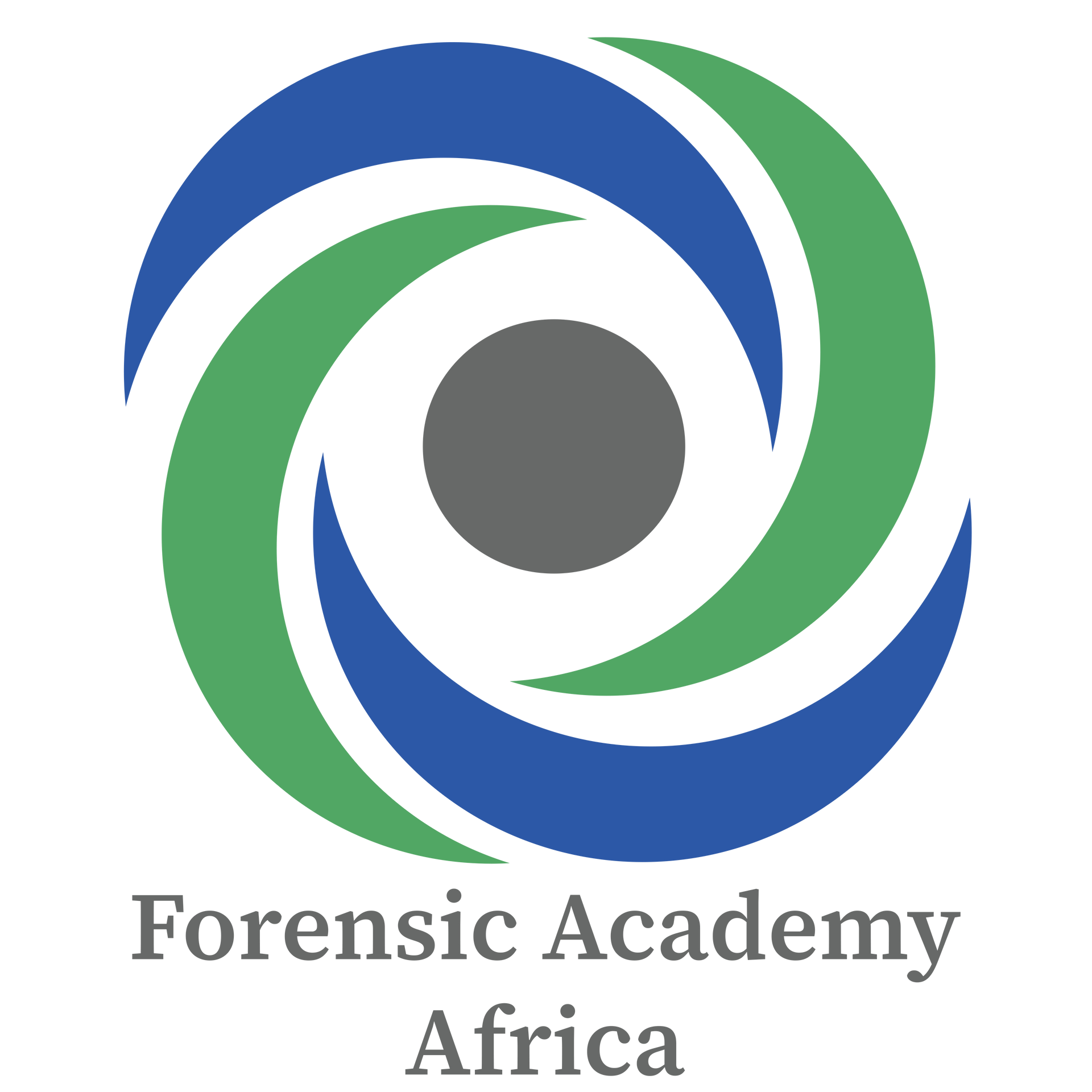Frequently Asked Questions
-
Did the name of the provider change?
Yes. Before 17 January 2024, the provider's name changed from Outsourced Learner Management (Pty) Ltd to Forensic Academy Africa (Pty) Ltd.
-
Why did the name of the provider change?
Outsourced Learner Management (OLM) is now Forensic Academy Africa! This new identity reflects our unwavering commitment to providing the highest standard of forensic education and our dedication to shaping the future of forensic science across Africa.
-
What is the career benefit of obtaining the National Certificate Forensic Science?
Obtaining this qualification provides a strong foundation in forensic science, equipping learners with critical skills in various aspects of the field, including forensic chemistry, biology, ballistics, questioned documents, and criminalistics. It prepares graduates for roles that support the justice system, health sector, financial sector, and safety and security in society.
-
What is the career benefit of obtaining the National Certificate Forensic Biology?
The National Certificate in Forensic Biology equips learners with specialised skills in forensic biology, specifically DNA analysis. These skills are crucial for roles in forensic science, enabling graduates to conduct advanced biological examinations and provide expert evidence in court. This qualification enhances the ability to solve complex forensic cases, making graduates valuable assets in forensic laboratories and investigative teams.
-
What is the career benefit of obtaining the Occupational Certificate Fraud Examiner?
With its comprehensive and specialised curriculum, this qualification equips professionals with the essential skills and knowledge to combat fraud and unethical behaviour across various industries. This qualification covers a broad spectrum of topics, from foundational theories of criminal behaviour and fraud prevention strategies to advanced techniques in fraud examination, legal procedures, and industry-specific fraud vulnerabilities. It provides the tools and expertise to proactively identify, prevent, and address fraudulent activities, ultimately fostering a resilient and ethically sound organizational culture.
-
Where can I look for employment after obtaining any of the qualifications on offer?
No training provider can guarantee employment; however, graduates can find employment in various sectors, including public sector agencies like the SAPS (South African Police Service) and private forensic laboratories. Opportunities also exist for independent contractors in the field. The roles available for qualified individuals include Forensic Examiners and Forensic DNA experts, where they can apply their specialised knowledge in practical forensic settings.
-
What is the duration of the National Certificate Forensic Science?
With a minimum credit value of 124, the National Certificate in Forensic Science requires 1240 notional hours.
Due to the intake-driven and content-integrated approach implemented on 1 August 2024, the completion period is ten months.
Consult the start and completion dates indicated in the Virtual Prospectus.
https://www.forensicacademy.africa/fs-nqf5-online
-
What is the duration of the National Certificate Forensic Biology?
With a minimum credit value of 121, the National Certificate in Forensic Science requires 1210 notional hours. Due to the intake-driven and content-integrated approach implemented on 1 August 2024, the completion period is thirteen months.
Consult the start and completion dates indicated in the Virtual Prospectus.
https://www.forensicacademy.africa/fb-nqf6-online
-
What is the duration of the Occupational Certificate Fraud Examiner?
With a minimum credit value of 255, the Occupational Certificate Fraud Examiner requires 2550 notional hours.
Due to the intake-driven, content-integrated, and prior experienced recognition approach implemented on 1 August 2024, the completion period is thirteen months.
Consult the start and completion dates indicated in the Virtual Prospectus.
https://www.forensicacademy.africa/ocfe-nqf8-online
-
Why are some legacy qualifications phased out?
Legacy qualifications allow for occupational qualifications developed based on the OQSF frameworks and standards. These new qualifications aim to address the evolving demands and advancements in industries, ensuring better alignment with the knowledge, skills, and competencies required in various fields. Due to their outdated nature, legacy qualifications may no longer adequately reflect the current needs of specific industries or possess the necessary relevance. The transition to occupational qualifications aims to bridge this gap by offering targeted, industry-specific training and education. Read the article on Embracing Change.
The Legacy Qualifications offered by Forensic Academy Africa is phasing out from 30 June 2026.
-
What happens after a legacy qualification ends?
The registration end date of some legacy qualifications was 30 June 2023; no new registrations are allowed after 30 June 2024. The latest date enrolled students can achieve these legacy qualifications is 30 June 2027. However, this date is overridden by the accreditation end date of the Skills Development Provider or Training institution, which in the case of Forensic Academy Africa is 31 December 2025.
Forensic Academy Africa did, however, submit a request for an extension of its accreditation to SASSETA due to the extended dates applicable to the two legacy qualifications it offers and waist an outcome.
-
Can I enrol for a degree after completing the National Certificate Forensic Science?
No. The natural progression will be to proceed to a qualification registered on the NQF 6 level, then NQF 7, etc.
However, it is advisable to consult the rules of the institution that offers the degree you wish to pursue to ensure that the degree or the institution does not make provision for articulation.
-
Can I enrol for a degree after completing the National Certificate Forensic Biology?
If articulation allows, yes. Read more at CHE Articulation.
-
Can I enrol for a degree after completing the Occupational Certificate Fraud Examiner?
This is seen as a post-graduate programme, so in principle, the answer is yes if articulation allows it. Read more at CHE Articulation.
-
Do you offer any bursaries?
No. However, we do offer payment options. Refer to the Virtual Prospectus of the relevant Programme/Qualification for Payment Options and Methods.
-
What is the meaning of articulation?
There are three types of articulation:
1. Horizontal articulation is within and between NQF Sub-Frameworks on the same NQF level.
2. Vertical articulation is articulation across NQF levels within an NQF Sub-Framework.
3. Diagonal articulation is articulation across NQF levels and across NQF Sub-Frameworks.
-
What are the articulation options of the National Certificate Forensic Science?
This qualification allows horizontal articulation with other NQF Level 5 qualifications. Vertically, it articulates with qualifications like the National Certificate in Forensic Biology, the National Certificate in Business Advising Operations at NQF 6, and the Bachelor of Policing Practices at NQF 6. Read more about SAQA #57651.
-
What are the articulation options of the National Certificate Forensic Biology?
The National Certificate in Forensic Biology is designed to build upon foundational forensic science knowledge. It provides in-depth training in specialised areas of forensic biology, preparing learners for advanced roles in the field. This qualification allows horizontal articulation with a BSc Degree in Molecular Biology. Vertically, it articulates with qualifications like a BSc Honours Degree in Molecular Biology and a BTech in Biology. Read more about SAQA #57977.
-
What are the articulation options of the Occupational Certificate Fraud Examiner?
It is advisable to consult the rules of the institution that offers the articulating degree you wish to pursue to ensure that the degree or the institution does not make provision for articulation. Read more about SAQA #101868.
-
What happens if I don’t understand the coursework?
Tutors are available to ensure that students receive targeted and effective help to grasp the coursework. This support is provided via e-mail, telephone, on the Online Learning Platform, and where possible, in person.

